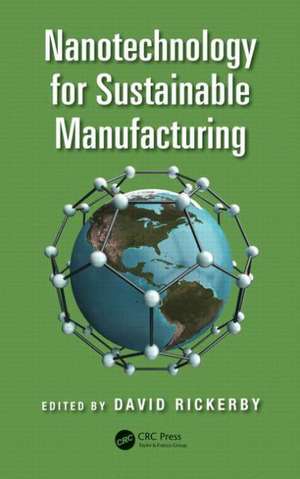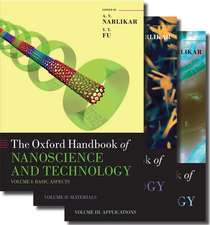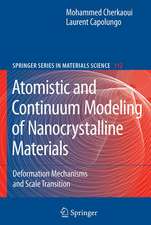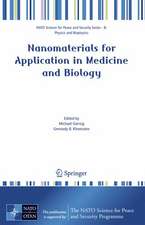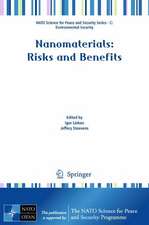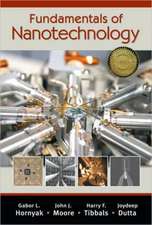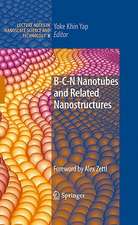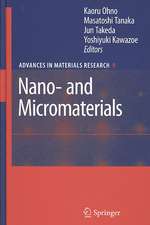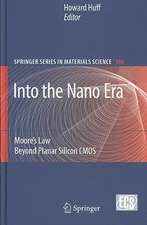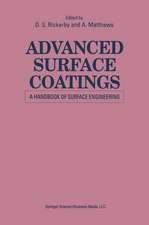Nanotechnology for Sustainable Manufacturing
Editat de David Rickerbyen Limba Engleză Hardback – 18 iun 2014
Written by leading experts from Europe, North America, Asia, and Australia, the book provides an innovative perspective by establishing connections between the subject areas associated with nanotechnology and by bridging the academic and industrial research gap. The topics covered include electronics, agrifood, aerospace, pulp and paper manufacturing, batteries, catalysts, solar energy, fuel cells, drinking water, and construction materials.
The chapters offer insights into the diverse industries that are currently or likely to be impacted by developments in nanotechnology and nanomaterials. They cover applications such as nanotechnology for alternative energy generation, improving water quality, and novel uses in agriculture and forest products. The book also addresses the use of life-cycle analysis for assessing the sustainability of nanotechnology-based products and processes.
Preț: 682.94 lei
Preț vechi: 991.03 lei
-31% Nou
Puncte Express: 1024
Preț estimativ în valută:
130.70€ • 135.95$ • 107.90£
130.70€ • 135.95$ • 107.90£
Carte tipărită la comandă
Livrare economică 14-28 aprilie
Preluare comenzi: 021 569.72.76
Specificații
ISBN-13: 9781482214826
ISBN-10: 1482214822
Pagini: 316
Ilustrații: 90 black & white illustrations, 8 colour illustrations, 9 black & white tables
Dimensiuni: 156 x 234 x 23 mm
Greutate: 0.58 kg
Ediția:1
Editura: CRC Press
Colecția CRC Press
ISBN-10: 1482214822
Pagini: 316
Ilustrații: 90 black & white illustrations, 8 colour illustrations, 9 black & white tables
Dimensiuni: 156 x 234 x 23 mm
Greutate: 0.58 kg
Ediția:1
Editura: CRC Press
Colecția CRC Press
Cuprins
Introduction. Nanotechnology in Electronics. Photovoltaics and Nanotechnology: From Innovation to Industry. How Nanotechnologies Can Enhance Sustainability in the Agrifood Sector. Biological Production of Nanocellulose and Potential Application in Agricultural and Forest Product Industry. Applications of Nanotechnology in Aerospace. Applications of Nanomaterials in Fuel Cells. Nanostructured Metal Oxide Catalysts. Solar Photocatalytic Drinking Water Treatment for Developing Countries. Applications of Nanotechnology in the Building Industry . Anticipatory Life-Cycle Assessment of SWCNT-Enabled Lithium Ion Batteries. Life-Cycle Assessment of Nanotechnology-Based Applications. Index.
Notă biografică
David G. Rickerby, PhD, is a senior scientific officer in the Institute for Environment and Sustainability at the European Commission Joint Research Centre, Ispra, Italy. After earning a doctoral degree from the University of Cambridge, he carried out postdoctoral research at the Pennsylvania State University. His present research interests involve evaluation of the potential risks and benefits of nanotechnologies, including development of risk assessment tools and methodologies. He was one of the group of international experts who coauthored a chapter on nanotechnology and the environment for the UNEP GEO Year Book and is a member of the OECD Working Party on Manufactured Nanomaterials, Steering Group 9 on the Environmentally Sustainable Use of Nanotechnology.
Descriere
Nanomaterials have the potential to contribute to more sustainable manufacturing through cleaner, less wasteful production processes and can substitute conventional materials, leading to savings in raw materials and energy. This book provides an innovative perspective by establishing connections between the subject areas associated with nanotechnology and by bridging academic and industrial research. It also covers methods for assessing the sustainability of nanotechnology-based products and processes using life-cycle analysis, taking into account material and energy consumption during manufacture, use, and final disposal and/or recycling.
